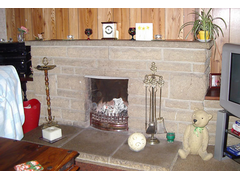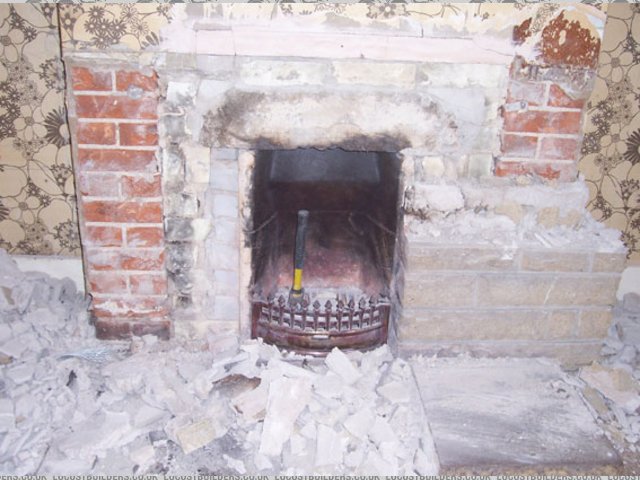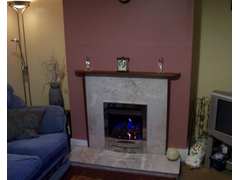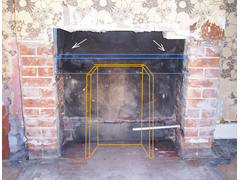NigeEss
|
| posted on 4/1/09 at 02:21 PM |

|
|
From gas to solid fuel...
Have a coal effect gas fire that I want to sack and fit a dirty, dusty high maintenance coal/wood fire.
Current fire is a steel box lined with moulded ceramic fibre insulation with a freestanding gas burner
stacked with 'coal'. In front is a decorative cast iron fender.
So can I replace the burner with a dog grate with ash pan and retain the rest or will the entire box
have to come out to reveal some ugly brickwork ?
The top of the box is open and there is no flue liner (was an open fire when house built and I bought
a gas one that needed no liner).
Obviously I want the Locost but safe option 
I could put a log stove in the ugly hole and line the flue but would rather have an open fire.
Time is an illusion. Lunchtime doubly so.................Douglas Adams.
|
|
|
|
|
907
|
| posted on 4/1/09 at 04:39 PM |

|
|
Hi
Last summer I did the opposite. Solid fuel to LPG
Pic below shows my late 70's build....
 
Rescued attachment f1.jpg
|
|
|
907
|
| posted on 4/1/09 at 04:41 PM |

|
|
And then the mess 
(they tell me early 70's wallpaper is coming back)
 
Rescued attachment f2.jpg
|
|
|
907
|
| posted on 4/1/09 at 04:45 PM |

|
|
And today...
What do you call a dog grate? Square free standing jobbie, or a fitted tapered one with curved front?
Paul G
 
Rescued attachment f3.jpg
|
|
|
NigeEss
|
| posted on 4/1/09 at 07:33 PM |

|
|
Ideally a fitted tapered one retaining the cast spiky fender similar to your first two pics.
Time is an illusion. Lunchtime doubly so.................Douglas Adams.
|
|
|
adam1985
|
| posted on 4/1/09 at 07:33 PM |

|
|
normally the box has to come out too and the gas pipe needs capping back to a safe place by someone who can do it it safely
the two main options for the box is either a concrete chair brick or a cast iron stove the burner box for your gas fire is only thin so will distort
very quickly with the heat and will rot very fast do to soot being acidic (sulphuric acid) i think it is
[Edited on 4/1/09 by adam1985]
|
|
|
907
|
| posted on 4/1/09 at 08:55 PM |

|
|
quote:
Originally posted by NigeEss
Ideally a fitted tapered one retaining the cast spiky fender similar to your first two pics.
Hi again.
Firstly I agree with Adam.
The pic below shows the original brickwork. There was probably some sort of cast iron range in there when the house was built. (1900 ish) (note the
red cardinal polish on the cement base)
After removal of your metal box you will need a fire back (in orange) and lintel (in blue).
Place the fire back in position and the lintel on top. A fire lintel has a 45deg angle on the bottom back edge.
Infill the sides and back with cement and any old broken brick rubble.
Slope the top of the infill back to the chimney so there are not any flat areas for soot to collect. You can see a line (white arrows) in pic 4 where
mine was.
You should end up with a 100mm (ish) gap for the smoke to go up.
Not sure on what sort of frontage you want, brick, marble, tiles, mantle etc. but the rest is up to you.
Hope this helps
Paul G
 
Rescued attachment f4.jpg
|
|
|
NigeEss
|
| posted on 4/1/09 at 10:48 PM |

|
|
Cheers guys,
fair point about the thin metal distorting.
Paul, there is a lintel from when it was an open fire, so I'll get a few fire bricks and knock something up.
Time is an illusion. Lunchtime doubly so.................Douglas Adams.
|
|
|
907
|
| posted on 4/1/09 at 11:16 PM |

|
|
quote:
Originally posted by NigeEss
Cheers guys,
fair point about the thin metal distorting.
Paul, there is a lintel from when it was an open fire, so I'll get a few fire bricks and knock something up.
Yup, I reused my old one.
I forgot to say that the fire back needs to be blocked up to allow for the thickness of the hearth.
The last job is to fill this well with strong a strong cement mix. (2 & 1)
Good luck
Paul G
|
|
|













